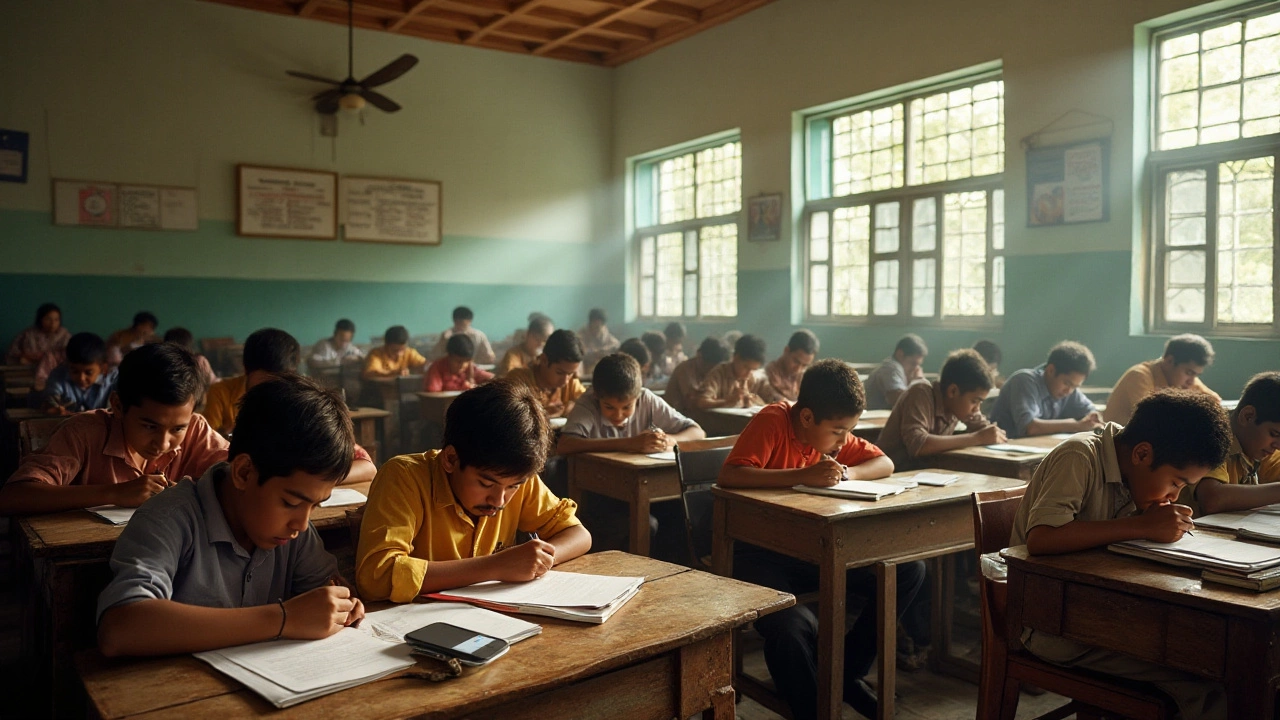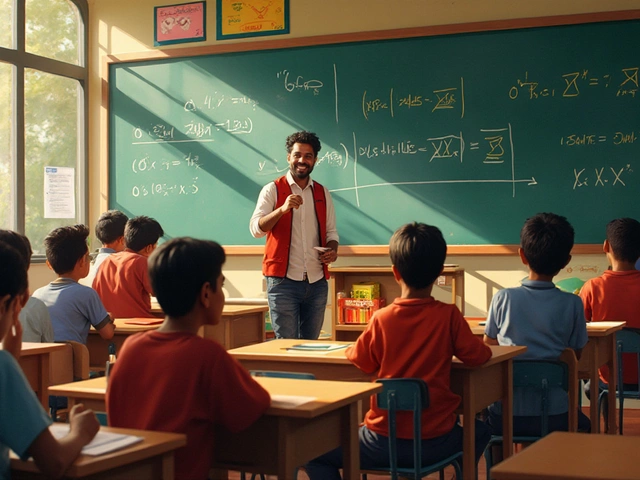
The Toughest Exams in History: A Comprehensive Guide
When it comes to exams, students often brace themselves for what might feel like an endless avalanche of stress and study marathons. Across the globe, competitive examinations are held in high regard, with some having earned the ominous reputation as being among the toughest of all. In this article, we will delve into the world of incredibly challenging exams, exploring the factors that contribute to their difficulty and what it takes to conquer them.
From ancient examination systems that set the groundwork for intellectual meritocracies to modern-day tests that determine careers with uncanny precision, these exams serve as gatekeepers of opportunity. Join us as we uncover what's behind these notorious tests and what aspiring candidates can do to tilt the odds in their favor.
- Introduction to Exam Rigors
- Historical Perspective on Challenging Exams
- Modern-Day Behemoths of Testing
- Cultural Influence and Educational Systems
- Preparation Techniques for High-Stakes Exams
- Surviving and Thriving: Success Stories
Introduction to Exam Rigors
Examinations have long served as a cornerstone in academic and professional fields, acting as the filter through which millions aspire to pass. The allure of success in a fiercely competitive exam is both daunting and exhilarating, especially when takers know they're up against some of the hardest exams on the planet. The pressure to succeed is immense, compounded by societal expectations and the personal dreams that hinge on these solitary bouts of testing brilliance. Students and professionals alike invest significant time and effort to face these educational Goliaths, driven by the promise of lucrative careers and esteemed positions.
The nature of these infamous examinations ranges from deeply analytical assessments of knowledge to brute demonstrations of problem-solving under uncompromising time constraints. Whether it’s the Indian UPSC Civil Services Examination that determines a candidate's eligibility for top government roles or The Bar exams in the United States that weed out the truly dedicated from the merely hopeful, each has its own labyrinthine structure designed to test various aspects of intelligence, memory, and diligence. Success in these competitive exams doesn't solely depend on rote learning; it requires critical thinking, strategic preparation, and immense discipline.
Understanding why certain exams rise to prominence as the most challenging often involves delving into the history and ethos of the culture that birthed them. Many competitive assessments draw from traditions—sometimes centuries old—that place immense value on intellectual prowess as a means to distinguish oneself. The Chinese Imperial Examinations, for instance, date back to the Han Dynasty, and were designed to select the most qualified candidates for civil service. Robert Oxnam, a well-known historian, noted, "The rigorousness of the Chinese exams set the tone for educational standards throughout Southeast Asia."
The rigorousness of the Chinese exams set the tone for educational standards throughout Southeast Asia.
As the gates of opportunity are closely guarded by these assessments, educational institutions and employers often regard successful candidates with high esteem. However, the weight of studying for such exams is no mean feat. According to recent educational metrics, students preparing for South Korea’s College Scholastic Ability Test (CSAT) reportedly study between 10 to 12 hours a day for over six months. The stakes are incredibly high, and this is mirrored in the pressure these exams exert on individuals' mental health, often leading to serious discussions about exam-related stress and the need for supportive interventions.
The modern manifestation of these assessments often integrates subject knowledge with skills such as analytical reasoning and ethical judgment, making preparation a comprehensive endeavor. Candidates utilize a variety of techniques, ranging from mock tests that mimic the exam environment to group studies that foster knowledge exchange. The journey to success in these arduous exams isn't merely a test of academic aptitude; it gauges emotional endurance and adaptability. It becomes a marathon, where the right strategy and persistent dedication can spell the difference between triumph and a faded attempt.
Historical Perspective on Challenging Exams
Delving into history, the notion of assessment through rigorous exams dates back centuries, illustrating humanity's perpetual quest for knowledge and societal structures. Among the earliest known examples is the Chinese imperial examination system, established during the Sui Dynasty in 605 AD. This examination was a colossal step in turning one's intellectual prowess into a measured, tangible merit. Spanning subjects from philosophy to poetry, it encapsulated a comprehensive approach to determining competencies for civil services. The exams were so arduous, spanning several days, that candidates often risked their health, as they were literally locked away in examination booths for the duration.
Fast-forward to the British civil service exams which emerged in the 19th century, heavily inspired by the aforementioned Chinese system. The emphasis was placed on moral fortitude, general intelligence, and knowledge of history and classics. These tests were not just hurdles but societal rites, defining prospective opportunities through erudition and eloquence. They became the blueprint for many competitive exams around the world, gradually embedding the concept that thorough vetting could lead to optimal governance and bureaucratic efficiency. It was believed, as the saying goes, "the pen is mightier than the sword," indicating the importance of intellect over brute strength in leadership roles.
"The civil service exams were not merely tests but a lifelong commitment to learning and intellectual cultivation," remarked historian Jonathan Spence, emphasizing their enduring impact on educational systems.The notion of what constitutes the 'hardest exams' evolved as societies changed; for instance, the Scholastic Aptitude Test (SAT) introduced in the United States in the 20th century was designed to assess a range of skills from mathematics to language, setting a new standard for university admissions. As globalization progressed, examinations became cultural cross-pollinators. Across the globe, these challenging tests offered insights into the educational methodologies of various cultures, each contributing unique aspects to the collective understanding of knowledge and measurement.
Ultimately, these historical examinations highlight the enduring nature of challenging tests as crucial societal gatekeepers. While the formats have changed, and subjects evolved to adapt to technological and scientific advancements, the core idea remains the same: to objectively filter and find those who hold not just knowledge, but the wisdom to apply it. As society continues to advance, the legacy of these rigorous historical exams will inevitably continue to shape the landscape of educational assessment and the broader societal understanding of merit.

Modern-Day Behemoths of Testing
The landscape of competitive exams has evolved significantly in recent years, reflecting ever-changing professional demands and educational expectations. Among these behemoths are tests that are renowned worldwide for their sheer difficulty and their transformative effect on prospects. Picture exams that encompass vast curricula, pressing thousands of hopefuls to outperform with military-like precision. The rigors of academic excellence have reached new heights with exams like the Indian Institutes of Technology Joint Entrance Examination (IIT JEE) and the Chinese Gaokao. Each year, millions of students prepare to undertake these grueling assessments that test not just academic knowledge, but the fortitude of one's character.
The IIT JEE is a prime example of a testing behemoth. Known for its labyrinthine problems and conceptual complexity, this exam opens the gates to prestigious institutions that are synonymous with technological prowess. Success requires years of preparation, a strategic mind capable of solving problems across disciplines, and an ability to remain calm under pressure. The stories of perseverance are countless, with candidates balancing rigorous coaching sessions alongside regular schooling to prove their mettle.
Equally daunting is the Gaokao in China, arguably one of the most critical exams worldwide. For Chinese students, the Gaokao is not just a test but a pivotal rite of passage. It’s an exam so essential that it governs who will access the upper echelons of the educational hierarchy. Preparation for this exam is intense, with candidates often immersing themselves in study for over twelve hours a day. Every detail counts, from text comprehension to solving intricate math problems with elegant precision. The stakes are high, leading to a nationwide period of study time perceived almost as a national holiday. "The Gaokao represents not just an exam, but the encapsulation of dreams and the future," states Zhang Wei, education reform researcher.
Beyond Asia, there are exams like the United States Medical Licensing Examination (USMLE) for aspiring physicians that require an enduring commitment to the mastery of medicine and patient care. This three-step examination process is notorious not only for its depth but for its insistence on practical proficiency over theoretical knowledge. Candidates often recount the exam as a marathon, where knowledge alone does not suffice; the ability to apply learning in real-world scenarios is imperative. A 2019 analysis revealed only a 96% pass rate for Step 1, suggesting that even the brightest minds face a substantial hurdle.
Furthermore, in Europe, tests such as the French Baccalaureate, with its comprehensive approach encompassing both humanities and sciences, commands admiration. Students navigating these exams confront a robust syllabus coupled with the challenge of excelling across multidisciplinary fronts. The exam concludes secondary education and casts a long shadow over one's subsequent academic pursuits.
These contemporary academic giants shape not just career paths, but the intricacies of national educational systems themselves. For many, the path taken through these examinations remains etched in memory as a testament to personal endurance and intellectual achievement.
Cultural Influence and Educational Systems
When it comes to the world's hardest examinations, one can't ignore the profound relationship between cultural influence and educational systems. These two aspects intertwine to create environments where such exams are not just academic hurdles but cultural milestones. In many countries, tests such as China's Gaokao, India's IIT-JEE, or South Korea's Suneung are integral to the societal fabric. They reflect the high value placed on academic achievement and how it often directs the course of an individual's life. These exams are intense rites of passage, a connective tissue binding the nation's aspirations with its education system. For instance, in China, the Gaokao is seen not merely as an entrance ticket to higher learning but as a crucial determiner of one's future social standing.
Cultural emphasis on education often leads to systems that are high-pressure by default, with students investing countless hours across years of preparatory studies. In Japan, the examination-centered education system is historically rooted, influencing even parental expectations. The result is a society where test scores dictate not only academic but also vocational outcomes. This intense focus on results has driven economies of education, including tutoring and special exam preparation schools, to thrive. The educational framework supports the notion of exams as the backbone of success, feeding into the ever-strengthening loop of competition. As a result, children grow in environments that prioritize knowledge acquisition as a metric for future success.
The ripple effects of such education systems extend beyond academics, directly affecting mental health and lifestyle choices. Students, driven by the burden of maintaining family honour or securing a prosperous career, often experience heightened levels of stress. A famous quote by South Korean education expert, "Education has always been the main driver of social advancement," illuminates how exams are perceived in various cultures. In cultures like South Korea, where success in exams is equated with acing life's hurdles, the mounting pressure sometimes leads to startling rates of stress-related issues among teenagers. In contrast—but equally telling—is Finland, where the lessened emphasis on testing reflects a cultural shift toward holistic education and student well-being.
Interestingly, international comparisons also showcase diverse educational outputs. The OECD's PISA test often highlights how countries with notoriously difficult domestic exams sometimes underperform in international assessments, while countries with less stringent testing thrive. This underscores the complex dynamics where cultural values influence how educational success is defined and measured. For instance, a society might prioritize analytical skills over rote memory, leading to exams that test application more than recall. Such nuances not only reflect in the tests themselves but also question the universal applicability of standardized metrics for gauging intelligence or competence.
Human capital development systems are therefore intrinsically tied to a nation's cultural aspirations and economic goals. As education reforms evolve, they often mirror societal change, whether toward egalitarian ideals or competitive excellence. The equations between hard exams and better futures aren’t always direct; they fluctuate with shifting cultural narratives about value and success. Global educators increasingly focus on balancing these divergent philosophies, seeking to retain cultural integrity while fostering student well-being. The hardest exams of all time, thus, are not solely academic feats but cultural symphonies, resonating with nations' historical and societal chords, shaping global educational landscapes.

Preparation Techniques for High-Stakes Exams
Preparing for hardest exams presents both a mental and physical challenge that requires a strategic approach. One crucial aspect is to start early – the earlier you begin your prep, the better your chances of covering all the material. Consistency is key, as it allows information to sink in and become second nature by the time the exam day arrives. Study sessions should be planned well in advance and consistently executed, tailored to one’s personal learning pace and style. It’s often suggested to create a timetable or a study schedule that realistically helps manage time and sets clear objectives.
Many experts agree that understanding the format and focus areas goes a long way in cracking these exams. Engaging with previous years' question papers and mock tests can provide invaluable insights into what to expect. These resources not only build familiarity but also aid in time management, a skill essential for getting through challenging exams. Incorporating varied study methods, such as group discussions and teaching others, can further boost retention of complex topics.
Stress management is another pillar of effective preparation. With the mounting pressures that come with competitive exams, it’s essential to find ways to relax and recharge. Regular physical exercise, mindfulness exercises, and ensuring adequate sleep can significantly improve concentration and cognitive functions. It’s important to balance study with relaxation, as overloading can lead to burnout.
Building a Strong Foundation
Success in rigorous exams often hinges on grasping fundamental concepts. A solid understanding of core principles can make tackling difficult questions much more manageable. Many candidates find it useful to revisit textbooks or online courses to refresh foundational knowledge. This is particularly useful in subjects like maths and science, where advanced problems thematically build upon basic theories. As educationist Richard Feynman once remarked, "The first principle is that you must not fool yourself—and you are the easiest person to fool." This reaffirms the need to solidify one’s foundational knowledge before exploring more complex layers.
"Intense preparation is a marathon, not a sprint. It's very important to pace yourself and not lose sight of self-care processes." – Dr. Emily Carter, Education Psychologist.Using a variety of resources is also encouraged. Educational videos, online libraries, and open-source platforms can offer deeper insights and alternative explanations, catering to different styles of learning. Such diversity in learning mediums can help unravel particularly perplexing topics. Some students benefit from forming or joining study groups, as collaboration can help clarify doubts and enhance understanding. Remember, knowledge shared is knowledge amplified.
Effective Note-taking and Review
It’s not just about absorbing information, but also about how you retain and recall it. Exam preparation strongly benefits from diligent note-taking and regular reviews. Adopting methods like the Cornell note-taking system or the use of flashcards can aid in organizing topics logically and memorably. Breaking down complicated material into smaller, manageable chunks can minimize anxiety and bolster retention. Additionally, revisiting notes periodically reinforces memory, ensuring the learning curve stays sharp.
Finally, don’t underestimate the power of rest. As you navigate through the process of getting ready for challenging tests, give your brain downtime to process and synthesize the learning. Exam prep should be holistic, addressing your intellectual readiness as well as your physical and emotional well-being. With these strategies, you can face the most daunting exams with a fortified resolve.
Surviving and Thriving: Success Stories
In the realm of competitive exams, tales of triumph are often as riveting as the exams themselves. They are stories of individuals who have not only survived the intensity but emerged stronger, providing a beacon of hope for aspiring candidates. Many successes arise from a potent combination of strategy, resilience, and sometimes, a bit of serendipity. One can't deny that the sheer effort invested by these individuals is monumental. These stories are rich tapestries woven with nights spent under dim lights, flipping through textbooks, and mornings when self-doubt knocks but determination prevails.
Take, for instance, the tale of a young woman from India who cracked the famous UPSC examination, known to be one of the most difficult exams globally. She credits her success to a structured routine and immeasurable perseverance. "Staying focused on the goal was essential," she explained in an interview. Her story inspires countless others, demonstrating that defeating daunting odds is indeed possible, especially when clarity of purpose aligns with disciplined preparation.
Across the oceans, in the UK, a young man's success in the medical school admission test tells a similar narrative, marked by perseverance and tenacity. He emphasizes the importance of practice and understanding the core material. "Most people think it's about cramming everything," he commented, "But really, it's about applying knowledge in different scenarios." These anecdotes underscore a crucial lesson: it's not solely about the volume of material studied but mastering the art of effective application.
Success stories from around the world often share common threads─tenacity, unwavering focus, and a robust support system. Parents, friends, and mentors often play unsung roles here, offering encouragement and emotional grounding. Having a support circle cannot be understated as psychological well-being is as significant as intellectual capability. Hearing an examiner say, "this candidate has shown remarkable insight and dedication," is a testament not just to knowledge but to the human spirit's resilience.
While specific strategies might differ based on the exam structure and personal preferences, certain approaches stand out universally. Formulating a study timetable that allows for breaks and recreation can be vital in avoiding burnout. Moreover, simulation exercises, such as practice papers under timed conditions, help acclimate candidates to the real testing environment. Anecdotal evidence suggests that visual learning aids, such as mind maps and flowcharts, help retain information effectively. Modern technology, including apps, podcasts, and online lectures, can be formidable allies in today's exam preparation landscape.
Conclusively, aspirational stories of those who aced the most challenging exams reveal the indomitable human ability to adapt and conquer. They echo a powerful sentiment: with strategic preparation and indomitable tenacity, even the most daunting exams can be transformed from formidable barriers into stepping stones towards a bright future. It is these stories of victory that continue to motivate countless aspirants, reminding them that the toughest exams, though hard, are not insurmountable.






Write a comment